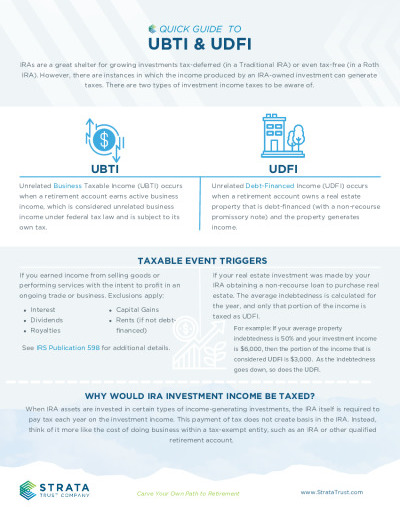What Is Unrelated Debt-Financed Income (UDFI)?
Unrelated Debt-Financed Income (UDFI) occurs when a retirement account, such as your IRA, owns a real estate property that is debt-financed (with a non-recourse promissory note), and the property generates income. Since this is considered unrelated to the tax-exempt status of the IRA (including Roth IRAs) under federal tax law, the income is subject to its own tax.
Limited partnerships, limited liability companies, real estate, and other entities that carry on an unrelated business or borrow funds to finance the acquisition of property may generate taxable income. Investments that are structured as notes, REITs, and other private corporations that are not LLCs or LPs will not trigger UDFI.
UDFI Calculation
The average indebtedness is calculated for the year, and only that portion of the income is taxed as UDFI.
For example, if your average property indebtedness is 50% and your investment income is $6,000, then the portion of the income that is considered UDFI is $3,000. As the indebtedness goes down, so does the UDFI.
| Annual Average Property Indebtedness | Investment Income | Taxable Income (UDFI) |
| Year 1 - 50% | $6,000 | $3,000 |
| Year 2 - 25% | $6,000 | $1,500 |
| Year 3 - 10% | $6,000 | $600 |
Accountholder Responsibilities
The account owner is responsible for calculating UDFI and determining if the filing of IRS Form 990-T is necessary. As a custodian for self-directed IRAs, STRATA does not file IRS Form 990-T, nor do we advise on or calculate UDFI. STRATA does not provide investment, legal, or tax advice. Individuals should consult with their investment, legal, or tax professionals for such services.
Find out more with STRATA's Quick Guide to UBTI & UDFI:

